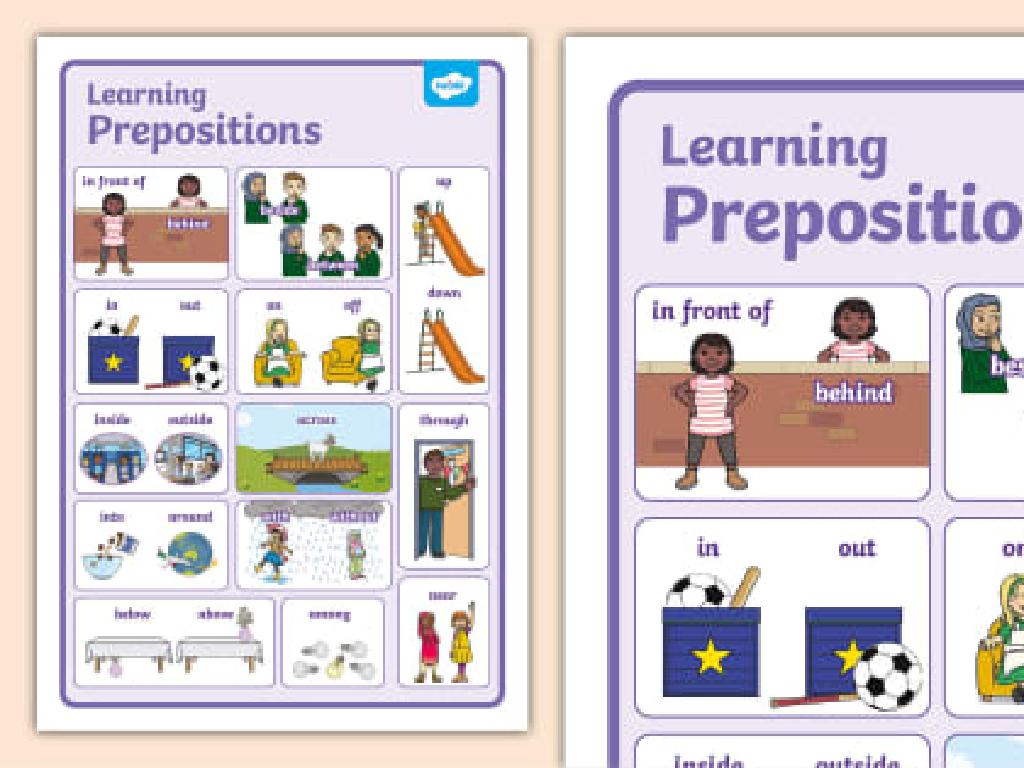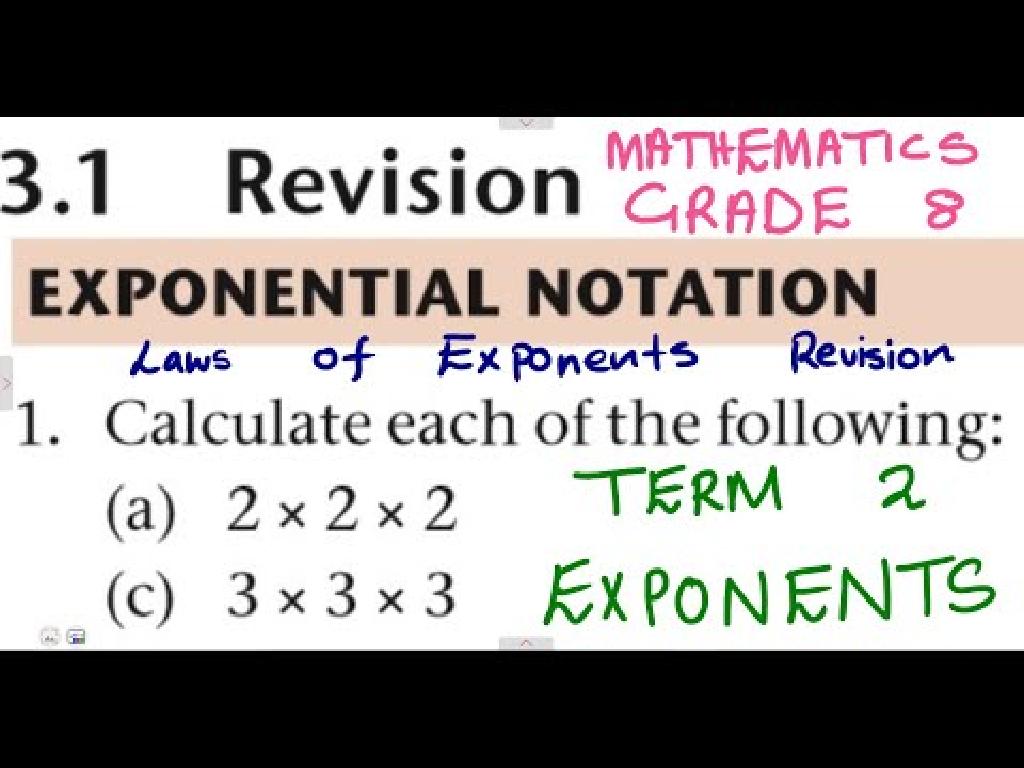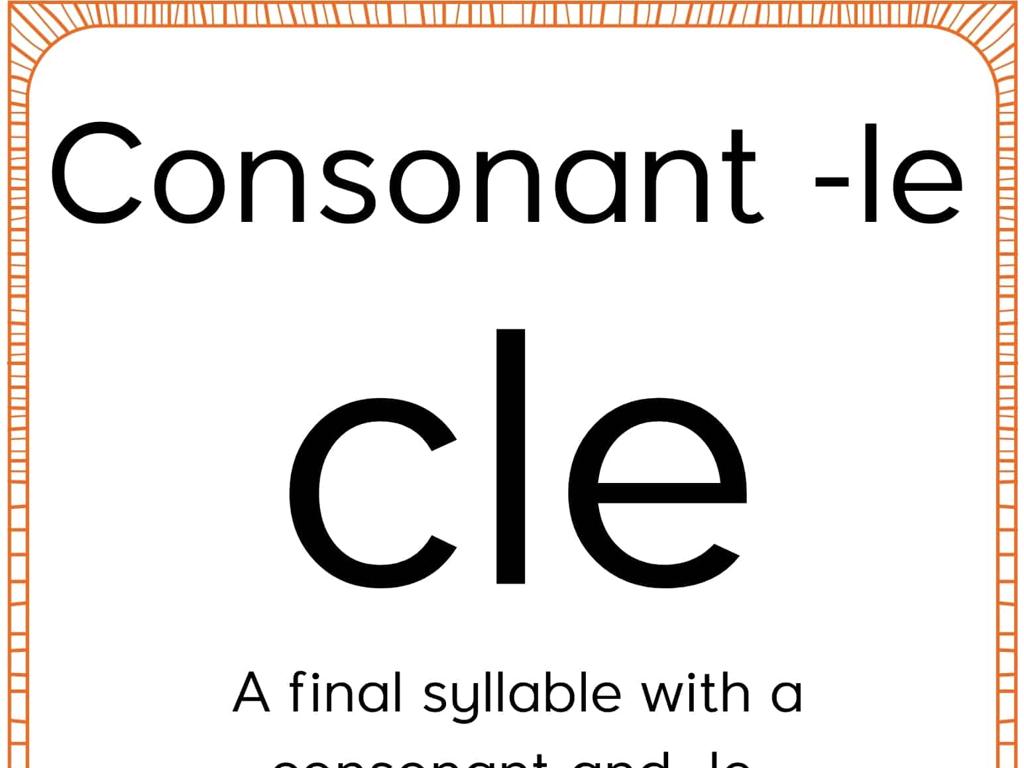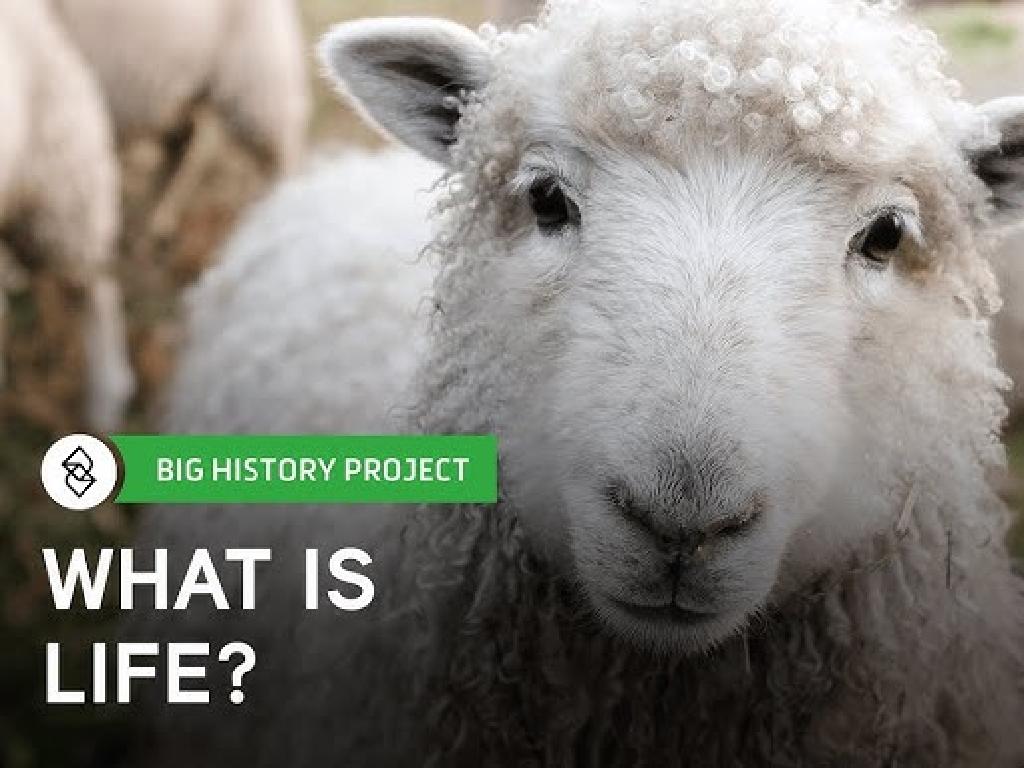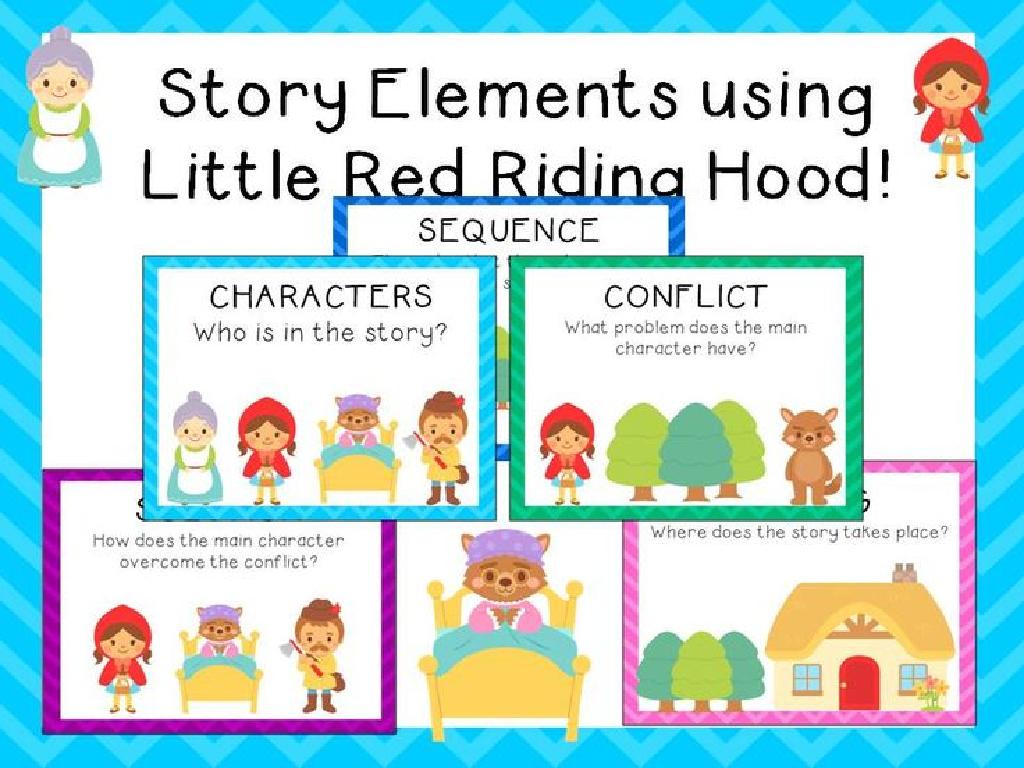Read Questions With Short Vowel Words
Subject: Language arts
Grade: Kindergarten
Topic: Short Vowels
Please LOG IN to download the presentation. Access is available to registered users only.
View More Content
Welcome to Short Vowels!
– Learn about short vowel sounds
– Short vowels make quick sounds, like in ‘cat’, ‘bed’, ‘fish’, ‘pot’, ‘sun’.
– Vowels: special alphabet letters
– Five vowels: A, E, I, O, U
– Practice with short vowel words
– We’ll read questions using words like ‘Is the cat on the mat?’ or ‘Can a hen peck?’
|
This slide introduces kindergarteners to the concept of short vowel sounds, which are foundational in learning to read and write. Emphasize the importance of vowels in the English language and ensure that students can identify each vowel. Use visual aids like flashcards to help them remember. Engage the class with examples of short vowel words and encourage them to make the sounds. Incorporate simple questions with short vowel words to help them apply their knowledge. During the lesson, monitor their pronunciation and correct gently. Plan activities where they can practice reading and recognizing these sounds in a fun and interactive way.
Exploring Short Vowels
– What are short vowels?
– Vowels make short sounds in some words.
– Each vowel’s short sound
– ‘a’ as in ‘cat’, ‘e’ in ‘bed’, ‘i’ in ‘fish’
– Examples: ‘cat’, ‘bed’, ‘fish’
– ‘o’ as in ‘pot’, ‘u’ in ‘sun’
– Practice with ‘pot’, ‘sun’
|
This slide introduces the concept of short vowels to Kindergarten students. Begin by explaining that vowels are special letters in our alphabet that can make different sounds. The short vowel sound is one of the sounds that vowels can make. Use visual aids or props to help students associate each vowel with its short sound. For example, show a picture of a cat when teaching the short ‘a’ sound. Encourage the students to repeat the words after you to practice the short vowel sounds. Plan a few simple activities where students identify the vowel sound in words or match words with pictures that have the same short vowel sound. This will help reinforce their understanding and recognition of short vowels in a fun and interactive way.
Exploring the Short Vowel ‘A’
– ‘A’ sounds like ‘a’ in ‘apple’
– Practice saying ‘a’ like in ‘cat’
– Try saying ‘a’ in ‘bat’, ‘mat’, ‘rat’
– Find words with the short ‘A’ sound
– Look for short ‘A’ in your favorite books
– Listen and repeat short ‘A’ words
– We’ll say words together: ‘hat’, ‘sat’, ‘pat’
|
This slide introduces the short vowel ‘A’ sound to Kindergarten students. Start by demonstrating the sound ‘a’ as in ‘apple’ and encourage the children to repeat after you. Engage the class by asking them to say ‘a’ as in ‘cat’ and other similar words. Guide them to identify words with the short ‘A’ sound in their environment or from books they enjoy. Practice listening and repeating exercises with words that have the short ‘A’ sound to reinforce their learning. The goal is to help students recognize and pronounce the short ‘A’ sound through interactive and fun activities.
Short Vowel ‘E’ Sounds
– ‘E’ as in ‘egg’
– Practice saying ‘e’ in ‘bed’
– Can you say ‘e’ like in ‘bed’? Try it out loud!
– Find words with the short ‘E’
– We’ll search for words together that sound like ‘egg’ and ‘bed’.
– Listen and repeat ‘E’ words
– I’ll say some ‘E’ words, and you echo me!
|
This slide introduces the short vowel ‘E’ sound to Kindergarten students. Start by demonstrating the ‘E’ sound using the word ‘egg’ and encourage the children to mimic the sound. Engage the class by asking them to say ‘e’ as in ‘bed’ to practice the sound in a common word. Then, move on to finding and listing words that contain the short ‘E’ sound, making it interactive by letting students come up with words as well. Finally, reinforce the lesson by saying words with the short ‘E’ sound and having the students repeat after you. This auditory and participatory approach helps solidify their understanding of the vowel sound.
Short Vowel ‘I’ Sounds
– ‘I’ as in ‘igloo’
– The short ‘I’ sounds like the ‘i’ in ‘igloo’.
– Practice saying ‘i’ in ‘fish’
– Can you say ‘i’ like in ‘fish’? Try it out loud!
– Find words with the short ‘I’
– We’ll search for words that have the short ‘I’ sound in them.
– Listen and repeat short ‘I’ words
– I’ll say some words, and you can repeat after me!
|
This slide introduces the short vowel ‘I’ sound to Kindergarten students. Start by explaining the sound with a familiar word like ‘igloo’. Encourage the students to practice the sound by saying the word ‘fish’ together. Then, engage the class in a word hunt activity where they look for words with the short ‘I’ sound in their books or around the classroom. Lastly, conduct a listening and repeating exercise where you say words with the short ‘I’ sound, and the students repeat them. This will help reinforce their understanding and pronunciation of the short ‘I’ sound.
Short Vowel ‘O’
– ‘O’ as in ‘octopus’
– Practice saying ‘o’ in ‘pot’
– Can you say ‘o’ like in ‘pot’?
– Find words with short ‘O’
– Look for ‘O’ in books or signs
– Listen and repeat ‘O’ words
– We’ll say ‘dog’, ‘log’, ‘top’ together
|
This slide introduces the short vowel ‘O’ sound to Kindergarten students. Start by explaining the sound ‘O’ makes, using ‘octopus’ as an example. Engage the students by asking them to repeat the sound after you, especially with the word ‘pot’. Encourage them to find and recognize words containing the short ‘O’ sound in their environment, such as in books or signs they see every day. Practice listening and repeating exercises with words like ‘dog’, ‘log’, and ‘top’ to reinforce the sound. Make the activity interactive and fun to keep the students interested and involved in learning the short ‘O’ sound.
Exploring the Short Vowel ‘U’
– ‘U’ as in ‘umbrella’
– Practice saying ‘u’ in ‘sun’
– Can you say ‘u’ like in ‘sun’?
– Find words with short ‘U’
– Look for ‘u’ in your favorite books
– Listen and repeat ‘U’ words
– We’ll say ‘u’ words together in class
|
This slide introduces the short vowel ‘U’ sound to Kindergarten students. Start by explaining that the short vowel ‘U’ has a unique sound, much like the first sound in ‘umbrella’. Encourage the children to practice saying the ‘u’ sound using the word ‘sun’ as an example. Engage the students in a fun activity where they search for words with the short ‘U’ sound in books or around the classroom. Finish with a group activity where everyone listens and repeats words that contain the short ‘U’ sound, enhancing their phonemic awareness and pronunciation skills. Make sure to praise their efforts to build confidence.
Reading with Short Vowels
– Practice reading sentences
– Spot the short vowel sounds
– Look for ‘a’ as in ‘cat’, ‘e’ as in ‘bed’, ‘i’ as in ‘fish’
– Understand short vowel usage
– See how short vowels fit into everyday words
– Enjoy learning new words
|
This slide is aimed at helping Kindergarten students practice their understanding of short vowel sounds within the context of reading simple sentences. Encourage the students to identify and vocalize the short vowel sounds in each word, reinforcing the phonics lessons they have learned. As they read, prompt them to notice how short vowels are used in various words, which will aid in their reading fluency and comprehension. Make the activity engaging by using a storybook or sentences that relate to their experiences. Offer praise and assistance as needed, and ensure that each child feels successful in their reading journey.
Questions with Short Vowels
– What are questions?
– Sentences that ask for information.
– Reading questions aloud
– We’ll read questions with words like ‘cat’, ‘bed’, ‘sit’, ‘hot’, ‘cup’.
– Listening for short vowels
– Hear the ‘a’, ‘e’, ‘i’, ‘o’, ‘u’ sounds in questions.
– Practice with examples
|
This slide introduces kindergarteners to the concept of questions and focuses on recognizing short vowel sounds within those questions. Start by explaining what questions are and how they are used to ask for information. Then, move on to reading questions that contain short vowel words, emphasizing the pronunciation of the vowels. Encourage the children to listen carefully to the vowel sounds as you read the questions together. Provide examples of short vowel words and craft simple questions around them to illustrate the point. For instance, ‘Is a cat big or small?’, ‘Can a hen lay an egg?’, ‘Will it fit in the box?’, ‘Is the pot hot?’, ‘Can you sip from a cup?’. Engage the students by asking them to repeat the questions and identify the short vowel sounds. This interactive approach will help them connect the sounds to the letters and words, enhancing their phonemic awareness and reading skills.
Class Activity: Short Vowel Quest
– Explore the classroom on a vowel quest
– Find objects with short vowel sounds
– Look for items like a ‘hat’ or a ‘pen’
– Share your findings with the class
– Practice saying the words aloud
– We’ll say the words as a group to learn
|
This activity is designed to help Kindergarten students recognize and practice short vowel sounds in a fun and interactive way. Set up the classroom with various objects that have short vowel sounds in their names. Guide the students to search for these items and encourage them to work together. As they find objects, such as a ‘hat’, ‘pen’, ‘mug’, ‘sock’, or ‘bug’, they should bring them to the group. Then, as a class, practice saying the words, emphasizing the short vowel sounds. This will help students associate the sounds with common objects, reinforcing their phonemic awareness. Prepare a list of objects with short vowel sounds to ensure a variety of examples. Praise the students for their discoveries and correct pronunciation to build their confidence.

